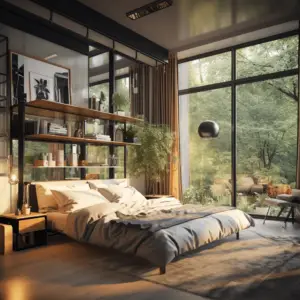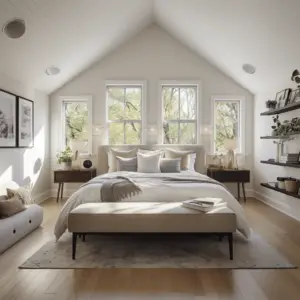Bedrooms , What is the difference in terms of resale value for a 3 bedroom vs. a 4 bedroom with the same square footage? Based on research conducted by Laura Abramson from Keller Williams, it creates a marginal difference to convert a 4 bedroom home into a 3 bedroom home, especially when the premise is on the smaller end of the spectrum.
That’s said, there’s a threshold in home size where a fourth bedroom can bring out a premium.
Ultimately, the resale value of a three-bedroom vs. a 4-bedroom home comes down to the square footage, given that not all square footage is created equal. It mostly depends on what you intend to do with the additional space.
A buyer may perceive a lot of value in a larger master bedroom or a second-floor laundry room. Meanwhile, buyers might see little value in the fourth bedroom being converted into a custom closet if there was already adequate closet space to get along with.
Having said that, let’s get closer to the differences in terms of value between a three-bedroom and four-bedroom home. We’ll also discuss how much value an additional bedroom can offer for a home in general.
Table of Contents
3 Bedroom Vs 4 Bedroom Resale Value

As mentioned above, not all square footage is created equal. It’s easy to assume that the more bedrooms you have, the higher the selling price of the home- but that’s not always the case. The question of whether a 3-bedroom home or a 4-bedroom home has a higher resale value can be attributed to the square footage and how it’s used.
In theory, a 4-bedroom home may sound more valuable, but the 3-bedroom home could have a larger living room or perhaps a bigger master suite, which is highly desirable among potential buyers. This, in turn, can make it a contender for the 4-bedroom. To provide a more detailed analysis, the following points compare average sale prices of 3-bedroom vs. 4-bedroom homes, subject to size.
How Much Value Does An Extra Bedroom Add?
The majority of property investors start by adding a second, third, or perhaps even fourth bedroom to the home that they’re flipping. Note that this move is based on the size of the property and the investor’s budget. You might ask why do they do this; or is it a nice move to make?
According to real estate experts, adding a new bedroom to a house could increase the overall value of the property by as much as 15 percent. This can bring about a substantial difference in the final asking price for a home. For every bedroom added onto a property, the investor, or homeowner can see the property value increase by as much as $30,000-$50,000.
Although this is what real estate experts estimate, the actual rise in value will be influenced by the specifics of your particular real estate market. In fact, there isn’t really a one-size-fits-all answer. The only reliable way to determine how much you can expect for an extra bedroom is to speak with the local experienced realtor.
Nonetheless, here are several considerations you should think through before adding an extra bedroom to your house to boost value.
The Location
Where the home is located in a significant factor in deciding whether or not the additional bedroom is worth it. Understanding what the buyers in your real estate are looking for will assist make a more informed decision. In most cases, adding a storage room or office is a better move and also requires less money and labor. This could free up space in the bedrooms, allowing the rest of the building to feel less crowded.
Loft Bedroom Conversion
While most homeowners try to expand their homes by converting excess space into bedrooms, this usually has a 50-50 chance of adding value. For example, some buyers might appreciate the idea of a finished basement bedroom, while others may not realize any value in it at all. With that said, the loft, or attic in your home is usually a great place to start when you’re planning to add an extra bedroom.
Depending on the current design of your house, converting a loft into a bedroom can be as easy as adding in a staircase or as complex as reconstructing walls. The most important factor is to ensure that the height of the ceiling is ideal for livable space. Attic space is generally a useful bedroom space, provided that you can stand and it’s easily accessible through a permanent set of stairs.
The cost of converting an attic or loft into a bedroom will be influenced by the location, scope project, and the real estate market- though it will likely range somewhere between $12,000-$50,000. In comparison to the standard cost of adding an extra bedroom from scratch- starting at 55,000- an attic bedroom conversion can be a more budget-effective option.
Other Considerations

There really isn’t one clear answer for whether an extra bedroom will lead to a higher value. However, here are some additional keeps to keep in mind before commencing your next home improvement project.
More is usually better: More bedrooms are often considered better value, considering that a house with more bedrooms is more marketable to potential buyers.
Every additional bedroom diminishes the value: Generally, the included value of additional bedrooms tends to reduce with each bedroom. Simply put, the value difference between a one-bedroom and a 2-bedroom is more significant than the value difference between a 3-bedroom and a 4-bedroom home.
Home Layout
It isn’t rare for a three-bedroom home to sell on par with a four-bedroom because of the layout of the house. Think of a 1400 square foot 3-bedroom home and a 4-bedroom home with equal square footage. Although one home obviously has more bedrooms that make it seem more valuable on paper, the 3-bedroom could have a bigger living room or possibly feel roomier in general.
If you’re planning to add an extra bedroom to your house, or converting your fourth bedroom into something, we recommend that you speak with an experienced realtor before you start any work. If the home is already small, adding an extra bedroom could create tiny bedrooms that are rather undesirable from a potential buyer’s standpoint.


